10 CRM Software to Transform Customer Service
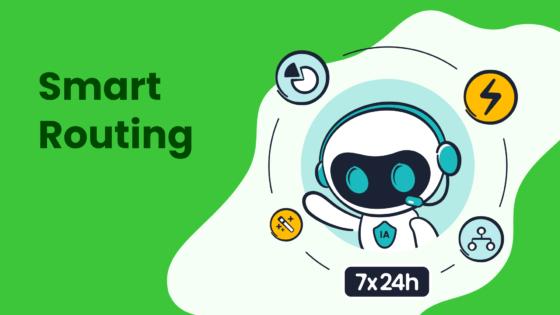
Imagine having a tool that transforms every customer interaction into an opportunity to build loyalty and trust. That’s exactly what CRM software for customer service does. With 68% of service leaders using it, tools like Sobot empower you to boost satisfaction and streamline operations by unifying data and automating tasks.
Understanding CRM Software for Customer Service
What is CRM software?
CRM software for customer service is like your digital assistant, helping you manage every interaction with your customers. It’s a tool that organizes, tracks, and analyzes customer data to improve relationships and drive business growth. Think of it as a hub where all your customer information lives, making it easier to deliver personalized service.
CRM stands for customer relationship management, which is a system for managing all of your company’s interactions with current and potential customers. The goal is simple: improve relationships to grow your business. CRM technology helps companies stay connected to customers, streamline processes, and improve profitability.
Modern CRM tools go beyond just storing data. They unify customer and company information from multiple sources, track interactions like sales calls and support tickets, and even use AI to predict customer needs. For example, Sobot’s omnichannel solution integrates voice, email, and social media, ensuring seamless communication across platforms.
Why is CRM essential for customer service?
Imagine trying to answer customer inquiries without knowing their history or preferences. That’s where CRM software for customer service steps in. It gives your team access to detailed customer profiles, helping them provide faster and more personalized support.
CRM systems also automate repetitive tasks, like ticket assignments or follow-ups, freeing up your team to focus on solving complex issues. In industries like retail or gaming, this efficiency can make all the difference. For instance, Samsung used Sobot’s contact center solution to unify communication channels and improve agent efficiency by 30%.
Additionally, CRM fosters collaboration within your organization. By centralizing data, it ensures everyone—from sales to support—is aligned in delivering exceptional service.
Key benefits of using CRM tools in customer support
CRM tools offer a range of benefits that transform how you handle customer service:
- Personalized Support: Access to comprehensive customer data allows your team to tailor responses, boosting satisfaction.
- Automation: Tasks like data entry and ticket routing are automated, saving time and reducing errors.
- Centralized Data: With all customer information in one place, you can analyze trends and make informed decisions.
- Improved ROI: According to industry reports, CRM systems deliver an average ROI of $8.71 for every dollar spent.
- Scalability: As your business grows, CRM tools like Sobot’s Cloud Call Center scale effortlessly, ensuring consistent service quality.
A CRM system doesn’t just improve customer support—it transforms it into a strategic advantage. Whether you’re managing policyholder information in insurance or player relationships in gaming, CRM tools help you stay ahead of the curve.
Top 10 CRM Software for Customer Service in 2025

Salesforce Service Cloud: A leader in CRM software for customer service.
Salesforce Service Cloud is a powerhouse in the world of customer service software. It’s designed to help you deliver exceptional support by unifying customer data and automating workflows. With features like AI-powered chatbots and real-time analytics, you can anticipate customer needs and resolve issues faster. Salesforce also offers omnichannel support, allowing you to connect with customers through their preferred channels, whether it’s email, chat, or social media.
What sets Salesforce apart is its scalability. Whether you’re a small business or a global enterprise, this platform grows with you. Plus, its integration capabilities with other Salesforce products make it a comprehensive solution for managing customer relationships.
HubSpot Service Hub: AI-driven insights for enhanced support.
HubSpot Service Hub takes customer support to the next level with its AI-driven tools. Imagine having a GPT-powered chatbot that handles repetitive queries, freeing up your team to focus on complex issues. HubSpot also provides real-time reply recommendations, speeding up response times and improving customer satisfaction.
| Feature | Description |
|---|---|
| GPT-powered Chatbot | Provides 24/7 support, allowing representatives to focus on complex issues. |
| Real-time Reply Recommendations | Speeds up resolution time with suggestions during customer interactions. |
| Conversation Summaries | Summarizes discussions to enhance understanding and follow-up actions. |
With these features, HubSpot helps you resolve tickets 50% faster and reduces closing time by 40%. It’s a game-changer for businesses looking to enhance customer engagement and streamline operations.
Zendesk: A versatile customer service software.
Zendesk is known for its versatility, offering tools that cater to businesses of all sizes. Its ticketing system and live chat functionality ensure no customer query goes unanswered. Plus, with over 1,200 prebuilt apps and integrations, you can customize the platform to fit your unique needs.
Zendesk serves over 150,000 customers worldwide, including big names like Uber and Shopify. This widespread adoption speaks volumes about its reliability and effectiveness. However, some users find its extensive features overwhelming, making it more suitable for larger organizations with complex needs.
Freshdesk: Simplifying customer interactions.
Freshdesk is all about making customer interactions simple and efficient. It converts queries from various channels—email, phone, chat, and social media—into tickets, ensuring nothing slips through the cracks. Its user-friendly interface is perfect for startups and small businesses, requiring minimal training to get started.
- Freshdesk’s omnichannel capabilities ensure consistent support across all customer interactions.
- Advanced automation tools reduce response times, allowing agents to focus on meaningful conversations.
- Robust analytics provide actionable insights to refine your customer service strategy.
If you’re looking for a straightforward yet powerful solution, Freshdesk is a solid choice.
Zoho CRM: Integration-friendly and scalable.
Zoho CRM is a favorite among businesses for its integration capabilities and scalability. It’s designed to grow with you, offering customizable tools that adapt to your processes. Whether you’re managing a small team or a large enterprise, Zoho CRM has you covered.
Zoho has consistently demonstrated its ability to scale effectively for growing organizations, making it an ideal choice for businesses like OP360. Its standout features include customization, cost-effectiveness, and seamless integrations.
With Zoho CRM, you can manage customer relationships effortlessly while keeping costs in check.
Microsoft Dynamics 365: Comprehensive customer relationship management.
Microsoft Dynamics 365 combines CRM and ERP capabilities into one powerful platform. It’s perfect for businesses looking to streamline operations and improve customer service. The platform offers AI-driven insights, helping you make data-informed decisions and deliver personalized experiences.
Its integration with Microsoft’s suite of products, like Office 365 and Teams, makes it a seamless addition to your existing tools. If you’re already using Microsoft products, Dynamics 365 is a natural fit for enhancing customer relationships.
Pipedrive: User-friendly and efficient.
Pipedrive is celebrated for its simplicity and efficiency. It’s designed with sales teams in mind but works equally well for customer support. The platform’s intuitive interface makes it easy to navigate, even for first-time users.
- Trusted by over 100,000 companies across 179 countries.
- Users report a 20% improvement in their sales process and a 40% reduction in administrative tasks.
If you value ease of use and efficiency, Pipedrive is a fantastic option for managing customer interactions.
Monday.com CRM: Customizable workflows for customer service.
Monday.com CRM stands out for its vibrant visual interface and powerful automation capabilities. You can create custom workflows, templates, and automation rules tailored to your needs.
- Customization of leads, accounts, and sales dashboards.
- Built-in automation for seamless data flow.
- Ability to manage multiple pipelines without technical expertise.
Its drag-and-drop functionality makes it easy to set up and navigate, ensuring your team can hit the ground running.
Intercom: Personalized customer engagement.
Intercom excels at delivering personalized customer engagement. Its tools are designed to foster meaningful interactions, helping you build stronger relationships with your customers.
| Insight | Percentage |
|---|---|
| Respondents who see increased loyalty from personalized experiences | 69% |
| Executives who agree customer engagement impacts bottom line | 88% |
With Intercom, you can track customer behavior, send targeted messages, and measure engagement success. It’s a must-have for businesses focused on customer-centric strategies.
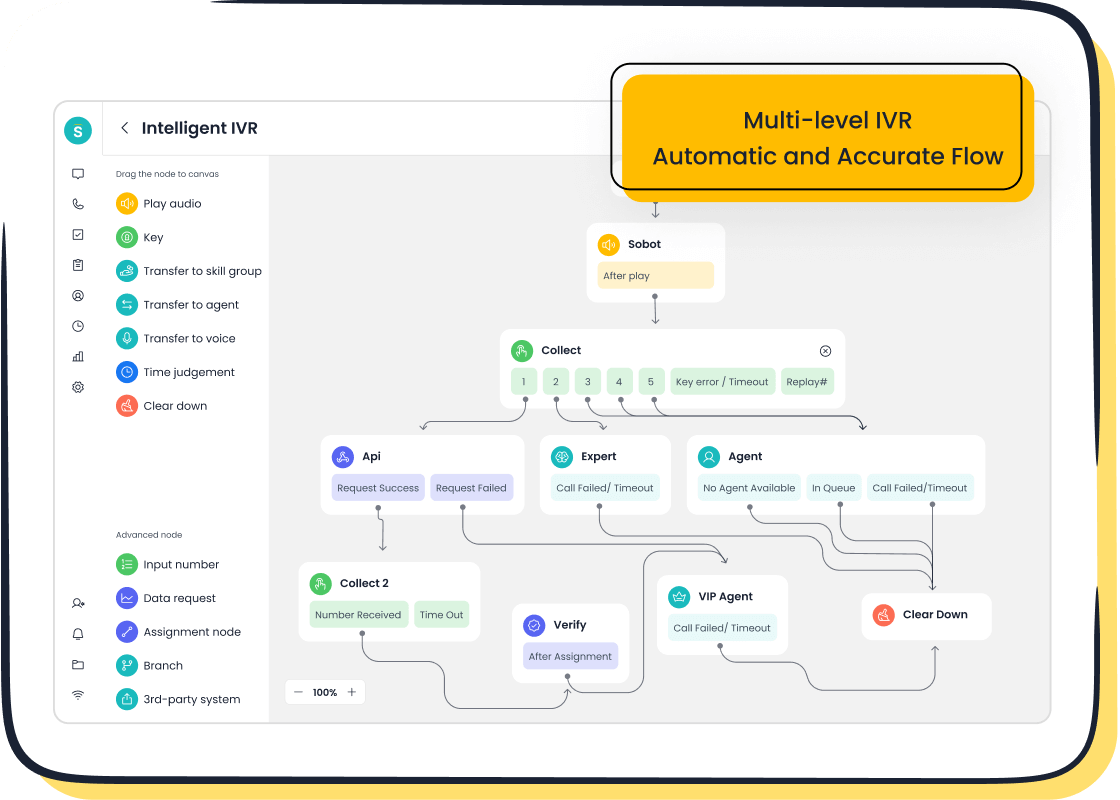
Sobot Voice/Call Center: A robust solution for global customer service.
Sobot Voice/Call Center is a game-changer for businesses aiming to provide top-notch customer service. Its intelligent IVR system, AI-powered voicebot, and global number availability make it a comprehensive solution for managing customer interactions.
| Metric/Case Study | Result |
|---|---|
| Customer satisfaction score | 96%+ |
| Problem resolution rate | 85% |
| Customer happiness rate | 99% |
Sobot’s platform is trusted by global brands like Samsung and OPPO, showcasing its reliability and effectiveness. With a 99.99% system uptime and seamless integration capabilities, Sobot ensures your customer support operations run smoothly.
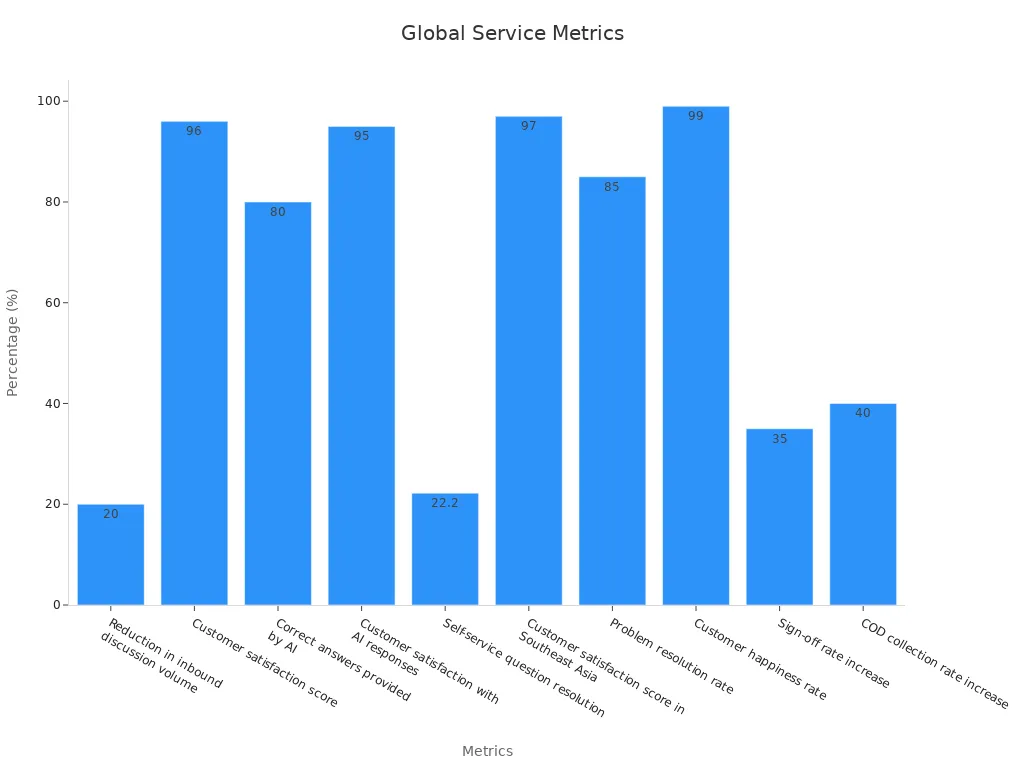
If you’re looking for the best customer service software, Sobot’s Voice/Call Center is a standout choice.
Features to Look for in the Best Customer Service Software
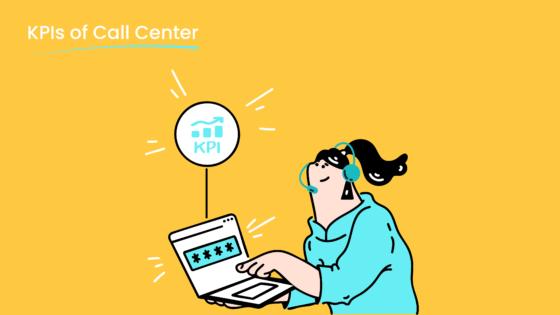
Omnichannel support for seamless communication.
Omnichannel support is a must-have feature in customer service software. It ensures that every interaction feels like part of a continuous conversation, no matter which channel your customers use. Whether they reach out via email, social media, or live chat, you can respond without missing a beat.
Did you know that 64% of customer service agents believe having a single view of customer interactions across all channels improves their performance? This feature doesn’t just help your team—it also keeps your customers happy. After all, 50% of customers are likely to switch to a competitor after just one poor support experience.
Sobot’s omnichannel solution is a great example. It integrates voice, email, and social media into one platform, giving your team a unified workspace to manage interactions efficiently. This kind of seamless communication boosts satisfaction and builds stronger customer relationships.
AI and automation for efficiency.
AI and automation are game-changers in customer service software. They handle repetitive tasks like ticket routing and follow-ups, freeing up your team to focus on complex issues. This not only saves time but also improves accuracy.
Take a look at the numbers: CRM productivity increases by 34%, and customer satisfaction improves by 25% when AI and automation are in play. Tools like Sobot’s AI-powered voicebot take it a step further by recognizing customer intent and providing intelligent responses.
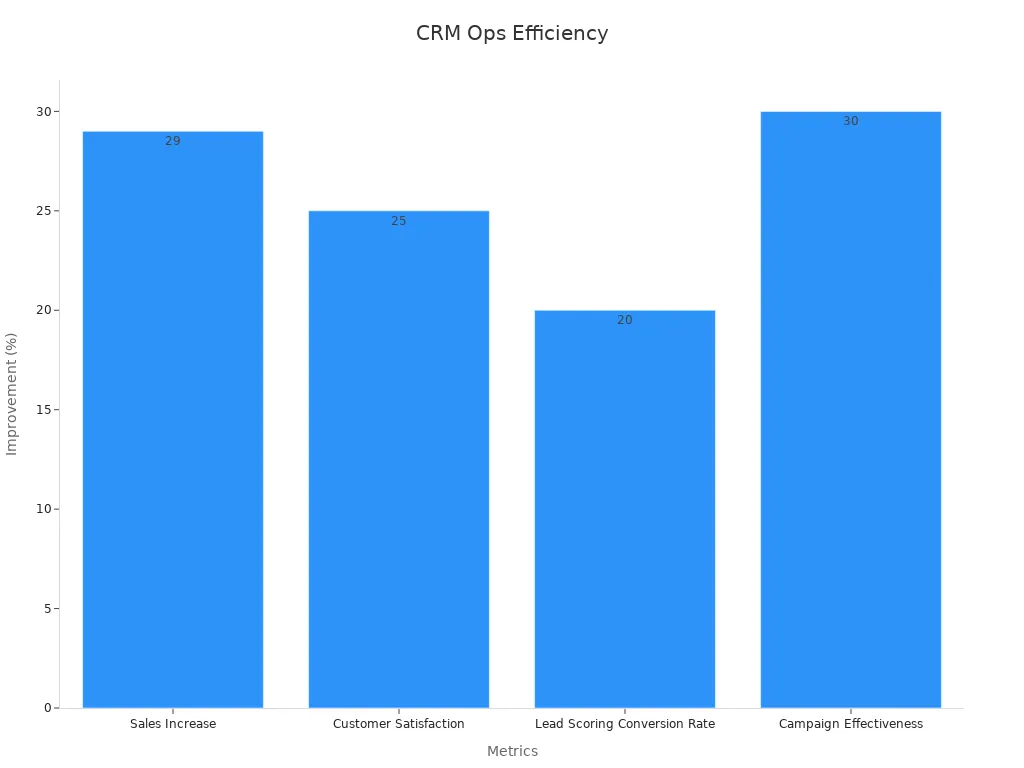
By automating workflows, you can speed up resolutions and deliver a better experience for your customers.
Integration capabilities with existing systems.
Your customer service software should work well with the tools you already use. Integration capabilities ensure a smooth flow of information, giving your team a complete view of customer interactions.
For example, Verilix successfully unified its IT processes by integrating its service desk software with existing systems. This improved efficiency and automated many tasks. On the other hand, companies like Neptogin struggled due to technical glitches and lack of training.
Sobot’s solutions shine here. They integrate seamlessly with popular platforms like Salesforce and Shopify, making it easier to manage customer data and interactions. This kind of flexibility ensures your team has everything they need to provide top-notch support.
| Feature | Description |
|---|---|
| Integration with Business Systems | Seamless integration with existing tools for a comprehensive view of customer interactions. |
| Automated Alerts | Flags important customer comments for quick and effective responses. |
| Customization and Flexibility | Allows adjustments to surveys and reports to meet specific business needs. |
| Ease of Use | Intuitive interface that enhances user experience and efficiency. |
| Scalability | Ability to handle increased data and features as the business grows. |
| Budget Considerations | Balancing cost with features to ensure good value for investment. |
Scalability to grow with your business.
As your business grows, your customer service software should grow with you. Scalability ensures you can handle increased workloads and user demands without compromising performance.
Modern tools use technologies like cloud computing and AI to make scaling easy. For instance, scalable software allows you to add features or users as needed, ensuring your operations stay efficient. Sobot’s Cloud Call Center is a perfect example. It offers a stable system with 99.99% uptime, making it reliable even as your business expands.
Scalability isn’t just about handling more data. It’s about staying competitive. With the right tools, you can adapt to market changes and continue delivering excellent customer support.
How to Choose the Right CRM Software for Your Business
Identifying your business needs and goals
Choosing the right CRM software starts with understanding what your business truly needs. Ask yourself: What are your goals? Do you want to improve response times, streamline workflows, or enhance customer satisfaction? Using the SMART criteria (Specific, Measurable, Achievable, Relevant, Time-bound) can help you define clear objectives. For example, you might aim to reduce ticket resolution time by 20% within six months.
Take a closer look at your current workflows. Are there gaps causing delays or inefficiencies? A business audit can uncover these issues and help you align your CRM strategy with your overall goals. For instance, if your customer service team struggles with fragmented communication, a solution like Sobot’s omnichannel platform can unify interactions across email, voice, and social media.
Understanding your customer journey is equally important. By mapping out how customers interact with your brand, you can choose a CRM that enhances their experience at every touchpoint.
Evaluating pricing and budget considerations
Budget plays a big role in your decision. CRM solutions come with different pricing models, and understanding these can save you from unexpected costs.
| Pricing Model | Description | Cost Implications |
|---|---|---|
| User-Based Licenses | Charges per user, which can escalate costs for larger teams. | Can become expensive as team size grows, complicating budget management. |
| Subscription Billing | Monthly or yearly fees for access to CRM features. | Predictable but can lead to significant long-term expenses if scaling is needed. |
| Open Source CRM on Self-Hosted Systems | Freedom to host and modify, but requires technical expertise. | Hidden costs may offset initial savings due to infrastructure and maintenance needs. |
For small businesses, subscription-based models or no-code solutions are often more affordable. Sobot’s Cloud Call Center, for example, offers a SaaS rental model that’s budget-friendly and scalable, making it ideal for growing teams.
Ensuring ease of use and team adoption
Even the most advanced CRM software won’t deliver results if your team doesn’t use it. Ease of use is critical. Look for intuitive interfaces and customization options that fit your team’s workflow.
Training and support also matter. A CRM system like Sobot’s Voice/Call Center provides a unified workspace, making it easier for agents to manage calls and customer data. Continuous training ensures your team feels confident using the software, while gamification can make adoption more engaging.
Leadership support is another key factor. When managers champion the CRM, it encourages the entire team to embrace it, leading to higher adoption rates and better results.
Checking for scalability and future-proofing
Your CRM should grow with your business. Scalability ensures you can handle more customers, data, and features as your needs evolve. Look for solutions that integrate AI and machine learning to provide real-time insights and improve decision-making.
For example, Sobot’s Cloud Call Center offers 99.99% uptime and global network support, making it a reliable choice for businesses planning to expand internationally. Future-proofing also means ensuring compatibility with emerging technologies and maintaining robust data security measures.
By choosing a scalable and future-ready CRM, you’re not just solving today’s problems—you’re setting your business up for long-term success.
CRM software has revolutionized how businesses approach customer service. It simplifies processes, boosts productivity, and enhances customer satisfaction. Tools like Sobot’s customer service software unify communication channels, automate tasks, and provide actionable insights.
Here’s why CRM tools matter:
- Efficiency in data capture ensures accurate decision-making.
- User acceptance reflects seamless team adoption.
- Automation improves productivity, saving valuable time.
- ROI highlights financial benefits through increased revenue.
- Customer satisfaction grows with personalized support.
Explore the top 10 customer service software options to find the perfect fit for your business. The right tool can transform your operations and elevate your customer relationships.
FAQ
What is customer self-service, and why is it important?
Customer self-service allows users to find answers or resolve issues without contacting support. It saves time, reduces costs, and improves satisfaction by empowering customers to help themselves.
How does self-service improve customer satisfaction?
Self-service tools like FAQs, chatbots, and knowledge bases provide quick solutions. Customers appreciate the convenience of solving problems instantly, leading to higher satisfaction and loyalty.
Can self-service tools integrate with CRM software?
Yes, most CRM platforms, including Sobot, integrate self-service tools. This ensures seamless data sharing, helping you deliver personalized support while reducing agent workload.
See Also
Best Customer Service Software Options for 2024
Leading Voice of Customer Tools Available in 2024
Essential Features to Look for in CRM Call Centers